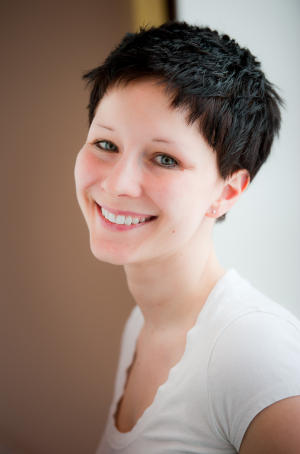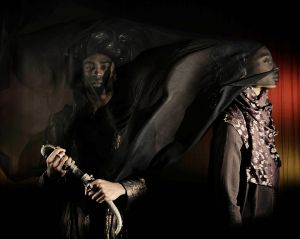Leah Adcock-Starr was raised on stories.
“I am the daughter of a teacher and a preacher, both theatre makers themselves; and I’m from the mid-west, where stories are the currency and glue of a community,” explains the MFA directing student. “Love of and need for story is programmed into my DNA.”
Now, on the eve of her first full main stage production at the School of Drama, Leah talks with us about the stories stuck in her head and how she’s bringing them to the stage.
Why did you propose The Arabian Nights for your first full main stage production?
The short answer is politics and religion. [The playwright] Mary Zimmerman takes on epic and mythic stories and makes them happen on stage, in theatrical, inventive, and beautiful ways. I find that inspiring and challenging. She wrote The Arabian Nights in response to the First Gulf War. I’d call The Arabian Nights an anti-war play, even though it doesn’t look like an anti-war play. As a theatre-maker, I hope to reveal our shared humanity. I believe that is the intent at the heart of this play. Story can be an agent of change in the world. This play is all stories. The stories literally save Scheherazade’s life. I love that story is her weapon to fight injustice. It might also be mine.
How do you go about bringing your vision to a play?
There are so many layers to the story-telling in The Arabian Nights. This layered-ness is one of the great challenges and opportunities offered to the artists who take it on. Scheherazade and Shahryar are always on stage. She begins to tell a story, that story comes to life on stage, and within it another story, and then another and so on. The stories may be ridiculous, or poetic, or physical. For me, it’s all about guiding the focus on stage so that it lands on the story at the heart of the play: a woman telling a story to change the heart of the man who has a knife at her throat. It can be easy to forget the stakes – that the story is Scheherazade’s mode of survival.
What are the central ideas you’re working with?
How do we lift the veil? How do we bring light into the space we inhabit, into our lives, and into the world? How do we reveal humanity? We do that by telling stories.
How do you view the directing process?
It’s alchemy. It’s hard work, preparation, craft and, a little magic. In the room, I’m an editor, a collaborator, and a creator. The actors bring their craft and creativity. I bring mine. Then we put all that to work in service of the story we need to tell. The director is the audience’s surrogate and advocate in the room. I love it when everyone comes into the room to play and explore the story. If I didn’t need other people in the room, I would do a different art form.
Can you speak to the directing program as a whole?
I feel so stupidly blessed and lucky to be here. I’m absolutely where I’m supposed to be. I knew it during the interview process. I walked out of the final directing callback a better director than I walked in. The UW was the only program I interviewed for that was interested in the director as the whole artist; and that has continued to be the case. The program is about getting you to be a creative leader no matter what text you have. We do so many different kinds of theatre – contemporary, realism, abstract, and classical. We test every muscle. The directing students take design and movement classes. Being in the same classes with the actors and designers, and learning their vocabulary, is a strength of the program.
Is there any play you’d love to direct?
I love Shakespeare. I’d like to tackle the canon. I’d like to do classical work that continues to surprise and challenge people. I love when you recognize yourself in classical plays; that moment when a character expresses what you have felt or experienced, but never have found the words for…that moment is magic.
The Arabian Nights opens Friday, February 28, with previews February 26 and 27, and closes March 9. Click here for tickets and more information.

